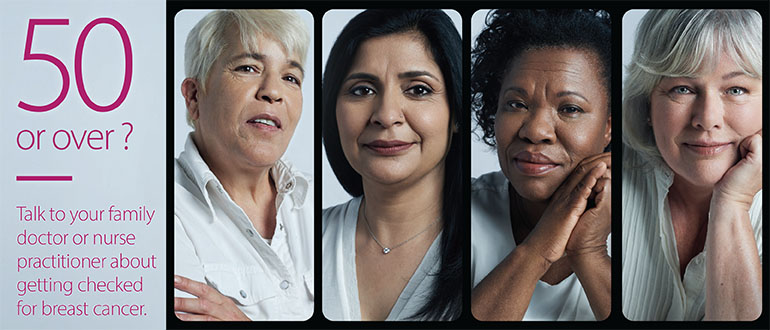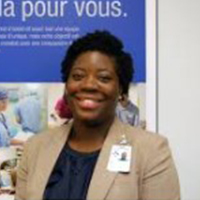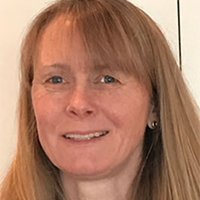toh
Ontario Breast Screening Program

Overview
The Ontario Breast Screening Program (OBSP) (opens in a new tab) is a province-wide, organized cancer screening program designed to encourage Ontario residents to get screened and lower their chances of dying from breast cancer.
The Ontario Breast Screening Program screens 2 different groups of people who are eligible for breast cancer screening in Ontario: those at average risk and those at high risk.
Cancer screening is testing done on people who may be at risk of getting cancer, but who have no symptoms and generally feel fine. Cancer screening tests are not meant to diagnose cancer. Instead, they help determine which people are more likely to have cancer or get cancer in the future.
Regular screening is important because it can find cancer early, when treatment has a better chance of working. Research shows that people ages 40 to 74 who get screened regularly with mammography can lower their chance of dying from breast cancer.
Talk to your family doctor or nurse practitioner about your breast screening options.
Average Risk Screening
If you are age 40 to 74, the Ontario Breast Screening Program (OBSP) recommends that most people in your age group be screened at least every 2 years with mammography. You are eligible for screening through the program if you:
- are a resident of Ontario
- have no new breast cancer symptoms
- have not been diagnosed with breast cancer
- have no current breast implants
- have not had a mastectomy
- have not had a screening mammogram within the last 11 months
You can make your own appointment and a requisition from your health care provider is not needed.
If you are 75 years of age or over, talk to your health-care provider about breast cancer screening. Cancer Care Ontario advises that the decision to screen people in this age group should be individualized. You will need to have a requisition to obtain an appointment.
High Risk Screening
If you are age 30 to 69 and meet the High Risk Ontario Breast Screening Program eligibility criteria, the program recommends that you get screened every year with both mammography and breast magnetic resonance imaging (MRI) (or screening breast ultrasound if MRI is not medically appropriate).
You are eligible for screening through the High-Risk Ontario Breast Screening Program if you:
- have gene changes that increase your chance of getting breast cancer (e.g., changes in the BRCA1, BRCA2, TP53, PTEN or CDH1 genes)
- have not had genetic testing, but have had genetic counselling because you have a first-degree family member with gene changes that increase their chance of getting breast cancer (e.g., changes in the BRCA1, BRCA2, TP53, PTEN or CDH1 genes)
- have a 25% or greater lifetime chance of getting breast cancer based on personal and family history (confirmed at a genetics clinic using the International Breast Cancer Intervention Study [IBIS] or Breast and Ovarian Analysis of Disease Incidence and Carrier Estimation Algorithm [BOADICEA] risk assessment tools)
- have had radiation therapy to the chest to treat another cancer or condition (e.g., Hodgkin lymphoma) before age 30 and at least 8 years ago (e.g., a person who is 35 and had radiation therapy to the chest at age 29 would be eligible for the High Risk OBSP when they are 37)
You must also:
- have valid Ontario Health Insurance Plan coverage
- have a referral from your doctor (referrals from nurse practitioners are not accepted)
- have no new breast cancer symptoms.
If you have a personal history of breast cancer or breast implants, you may get screened through the High-Risk Ontario Breast Screening Program if you meet program eligibility criteria.
Schedule a Mammogram
If you are a person 40 to 74 years of age, you can refer yourself to OBSP by calling any of the locations in the Champlain Region listed below or go to: Ontario Breast Screening Program Locations (opens in a new tab)
If you are 30 to 69 years old and think you may be at high risk for breast cancer, you should visit your family doctor. They can send you for an assessment or for screening based on your family and medical history.
| The Ottawa Hospital – Hampton Park Plaza 1419 Carling Avenue, Suite 214, Ottawa (613) 761-4831 1-800-465-6226 Fax: 761-4405 |
Hôpital Montfort 713 Montreal Road, Ottawa (613) 748-4931 Fax: 613-748-4955 |
| Arnprior & District Memorial Hospital 350 John Street North, Arnprior (613) 623-7962, ext. 359 Fax: 613-623-7802 |
Kemptville District Hospital 52675 Concession Road, Kemptville Tel: (613) 258-6133 ext. 400 Fax: 613-258-4997 |
| Clarence Rockland Imaging 2741 Chamberland Street, Suite 207, Rockland (613) 446-4263 Fax: 613-446-0616 |
Merivale Medical Imaging 1370 Clyde Avenue, Nepean 613-727-1072 ext. 1 Fax: 613-727-5873 |
| CMA Kanata Imaging 150 Katimavik Road, Suite 102, Kanata (613) 592-0711 Fax: 613-592-1412 |
Pembroke Regional Hospital 705 Mackay Street, Pembroke (613) 732-1463 1-800- 307-7059 Fax: 613-732-6338 |
| CMA Orleans Imaging 2003 St. Joseph Boulevard, Basement Unit (613) 824-3252 Fax: 613-824-6633 |
Queensway Carleton Hospital 3045 Baseline Road, Ottawa (613) 721-4711 ext. 3 Fax: 613-721-4761 |
| CMA Phenix Imaging 595 Montreal Road, Suite 205, Ottawa (613) 745-5665 Fax: 613-749-3416 |
Renfrew Victoria Hospital 499 Raglan Street North, Renfrew (613) 432-4851 ext. 807 1-800-916-6277 Fax: 613-434-3610 |
| Cornwall Community Hospital 840 McConnell Avenue, Cornwall (613) 361-3850 Fax: 613-361-3851 |
St. Francis Memorial Hospital 7 St. Francis Memorial Drive, Barry’s Bay (613) 432-4851 ext. 807 1-800-916-6277 Fax: 613-434-3610 |
| Deep River District Hospital 117 Banting Drive, Deep River (613) 732-1463 1-800-307-7059 Fax: 613-732-6338 |
Winchester District Memorial Hospital 566 Louise Street, Winchester (613) 744-2422, ext. 6260 Fax: 613-774-5385 |
| Hawkesbury & District General Hospital 1111 Ghislain Street, Hawkesbury (613) 632-1111 1-800-790-8870 Fax: 613-636-6163 |
Premier Imaging 4289 Innes Road, Orleans (613-686-1904 Fax: 613-830-1902 |
OBSP Services
Communication to women and healthcare providers
Cancer Care Ontario (CCO) sends letters to people turning 40 inviting them to get screened for breast cancer. Letters are sent to those aged 40 to 74 reminding them when it is time to return (recall) for screening and informing them of their results, if they are normal.
Coordination and Navigation
Coordinates follow-up tests, track test results and provide navigation from abnormal screen to final diagnosis for people with abnormal screening results. Most average risk people (85%) needing follow-up tests have non-invasive procedures such as special mammographic views and/or ultrasounds. If you do not have a healthcare provider, you will be assigned a doctor who will follow you until you have a diagnosis.
- Suggest appropriate screening recall interval based on a person’s screening result and risk factors
- Arrange genetic assessment (if appropriate) for referrals to the OBSP High Risk Screening Program.
Commitment to quality
Evidence shows that image quality is increased, and variability is decreased in facilities participating in a province-wide screening program.
There is a rigorous quality assurance program involving all aspects of the Ontario Breast Screening Program.
- Mandatory accreditation thru the Canadian Association of Radiologists Mammography Accreditation Program (CAR-MAP).
- Regular inspection of mammography equipment by medical physicists.
- Regular mammography equipment quality control testing.
- Radiologist performance monitoring and annual reporting.
- Technologist performance monitoring.
Outreach
Presentations/workshops are provided to regional groups and healthcare providers upon request to provide information and education about the screening program’s benefits and outcomes.
Resources for the Public
Our Team
Our team consists of mammography technologists, radiologists and registered nurses and administrative staff. Primary care providers, like your family doctor or nurse practitioner also play an important role in this program by making referrals, discussing results and risk factors with you, and addressing any questions or concerns.
Regional team leaders include:

Ellen Odai Alie
Manager, Integrated Cancer Screening and Prevention and Corporate Manager, Breast Imaging

Dr. Anna Wilkinson
Regional Primary Care Lead

Dr. Jean Seely
Regional Breast Imaging Lead
Last updated on: October 8th, 2024


 To reset, hold the Ctrl key, then press 0.
To reset, hold the Ctrl key, then press 0.